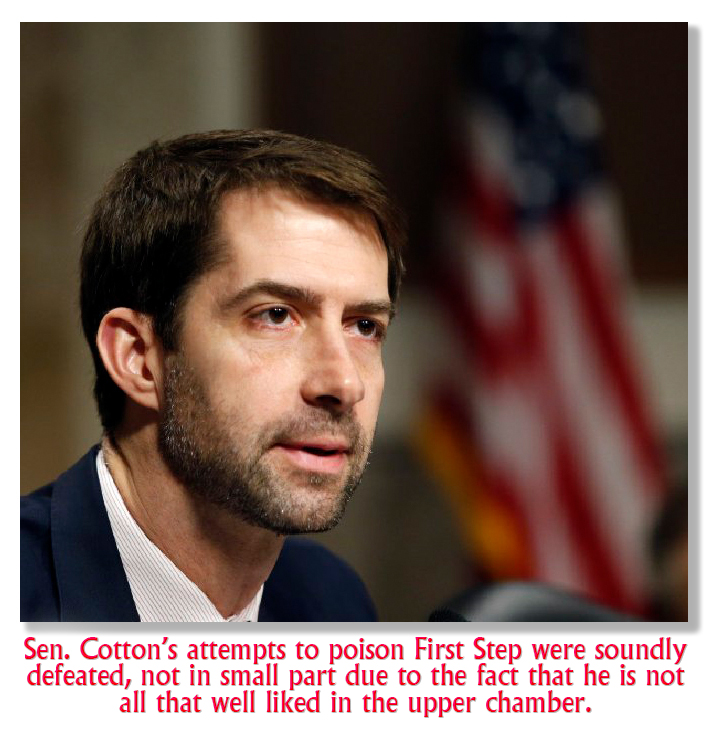We post news and comment on federal criminal justice issues, focused primarily on trial and post-conviction matters, legislative initiatives, and sentencing issues.

WELL, 2021 WAS KIND OF DISAPPOINTING…
 We all had high hopes for criminal justice reform when President Biden took the White House, and the Democrats won control of the House and Senate. The year 2021 was widely seen as the end of a dark era and the beginning of a brighter one. As Reason magazine said last week, it wasn’t just the close of just any year. It was the end of 2020.
We all had high hopes for criminal justice reform when President Biden took the White House, and the Democrats won control of the House and Senate. The year 2021 was widely seen as the end of a dark era and the beginning of a brighter one. As Reason magazine said last week, it wasn’t just the close of just any year. It was the end of 2020.
Over the last 12 months, politicians h some steps to advance justice reform. But as is the case with so many New Year’s expectations, quite a bit also stayed the same.
Since Biden’s inauguration, criminal justice reform has taken a back seat to his more prominent initiatives, last March’s American Rescue Plan, the Infrastructure Investment and Jobs Act in November, and the now seemingly-dead Build Back Better social-spending blowout.
Biden did issue an executive order canceling contracts with private prison operators, a nice change for the 14,000 people in those joints. And his Dept, of Justice finally reinterpreted the CARES Act to let people on home confinement stay there. He has promised clemency reform. But the real work is to be done in Congress, w has yet to progress.
If you stayed awake in high school, you recall that every Congress lasts two years. Any bill introduced in the 117th Congress – which began in January 2021 – will stick around until the 117th expires a year from today. That means that the reform bills now in front of Congress still have a chance.
On New Year’s Day, the San Francisco Chronicle called for a targeted bill to abolish mandatory minimums, said, “The good news is that criminal justice reform can be accomplished with relatively limited expenditures — compared to, for example, Build Back Better’s sweeping expansion of the social safety net. That gives it a fighting chance of passing in today’s barely Democrat-controlled Congress.”
A couple of bills before Congress would reduce but not eliminate mandatory minimums: the EQUAL Act (lowers minimums for crack to equal those of powder) has passed the House but hasn’t yet cleared committee in the Senate; the MORE Act (decriminalizes marijuana retroactively) has been approved by a House committee but has not been passed by the House or Senate; the First Step Implementation Act (makes First Step mandatory minimum reductions retroactive) and the Smarter Sentencing Act (reduces mandatory minimum penalties for certain nonviolent drug offenses only) have not even cleared committee in either the House or Senate.
While the House also passed the MORE Act to decriminalize marijuana, the measure has been dead on arrival in the Senate, where Senate Majority Leader Chuck Schumer (D-New York) announced plans to draft his own version of the bill. The Schumer bill has been released as a working draft but has yet to be formally introduced.
In the House, Republican Rep. Nancy Mace (South Carolina) introduced the first GOP-sponsored bill in Congress to legalize marijuana, hinting that there may be openness to a bipartisan solution in the future. If the Democrats fail to take advantage of the political opportunity in front of them, Forbes said last week, they risk ceding this issue to the Republicans if and when they take back control of Congress, possibly as soon as next year.
When the SAFE Banking Act, a marijuana bill, passed the House last year, it got 106 Republican votes, demonstrating that the GOP can deliver votes on cannabis legislation. But the MORE Act that passed the House in the last Congress – the one with criminal retroactivity – received only five Republican votes. The current MORE Act has collected only one Republican co-sponsor.
 The problem is that most bills spend months in committee with no movement, or they pass in the House only to the Senate before dying out. And with mid-terms putting all of the House and a third of Senate up for re-election in November and crime rates shooting up, getting legislators on board for criminal justice reform is going to be more challenging.
The problem is that most bills spend months in committee with no movement, or they pass in the House only to the Senate before dying out. And with mid-terms putting all of the House and a third of Senate up for re-election in November and crime rates shooting up, getting legislators on board for criminal justice reform is going to be more challenging.
And then there are demagogues like Sen. Tom Cotton (R-Arkansas). Last week, he wrote in Real Clear Politics:
Unfortunately, soft-on-crime policies have been, at times, a bipartisan problem. In 2018, Republicans passed the pro-criminal First Step Act. That deeply flawed legislation reduced sentences for crack dealers and granted early release to some child predators, carjackers, gang members, and bank robbers. Ironically, this jailbreak bill even provided early release for those who helped prisoners break out of jail. This misguided push by Republicans to win applause from liberals strengthened the hand of radicals like George Soros. In a political environment where the parties compete for who can be more pro-criminal, the Democrats will always win.
People like Cotton make even common-sense federal criminal justice reform a hard sell.
Reason, In 2021, Qualified Immunity Reform Died a Slow, Painful Death (December 30, 2021)
Forbes, The Least Eventful Year for Marijuana (December 31, 2021)
San Francisco Chronicle, Biden’s agenda is stuck. It doesn’t have to be that way with criminal justice reform (January 1, 2022)
S. 79: EQUAL Act
H.R. 3617, MORE Act
S. 1013: Smarter Sentencing Act of 2021
S. 1014: First Step Implementation Act of 2021
Brookings Institution, The numbers for drug reform in Congress don’t add up (December 22, 2021)
Real Clear Politics, Recall, Remove & Replace Every Last Soros Prosecutor (December 20, 2021)
– Thomas L. Root


